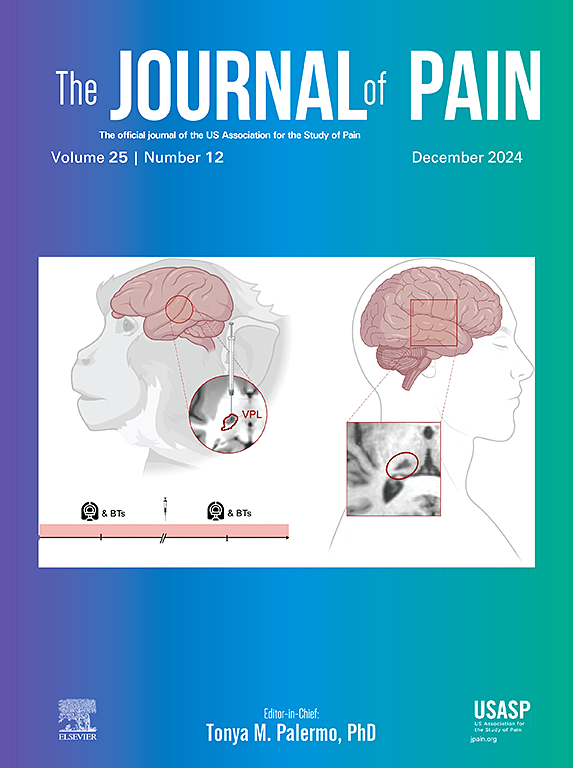裸盖菇素在慢性疼痛康复中的作用。
IF 4
2区 医学
Q1 CLINICAL NEUROLOGY
引用次数: 0
摘要
那些患有慢性疼痛和共病功能残疾的人经常面临身体和情感上的转变,影响他们的身份和获得生活意义的能力。尽管使用各种药物和非药物治疗来缓解症状,但镇痛程度和功能恢复远未达到最佳状态。包括抑郁和焦虑在内的心理障碍,以及适应不良的认知情感状态,如疼痛灾难化和运动恐惧,共同影响了参与者对康复服务的参与,导致功能状态进一步恶化,同时使疼痛症状长期存在,形成持续的、痛苦的回避和久坐行为循环。已知裸盖菇素通过改变负责自我参照和感觉运动处理的关键大脑区域之间的功能连接而产生意识状态的改变。虽然初步证据表明,在那些有精神疾病和无用的应对技能的患者中,它的治疗效果是显著的和有利的,但关于它的镇痛潜力和通过改变自我感知和意义创造过程来促进参与有组织的康复计划的能力的研究有限。目前的重点文章探讨裸盖菇素作为心理物理适应原在慢性疼痛患者中的应用。我们建议裸盖菇素可以通过重塑运动参与的感知障碍来同时改善疾病识别和神经运动结果。观点:这篇重点文章探讨了裸盖菇素通过调节自我感知和意义产生过程来提高慢性疼痛康复患者参与度的潜力——这两个尚未被充分探索但对成功的疼痛管理至关重要的障碍。我们还提出了一种新的整合框架,将有针对性的运动治疗纳入裸盖菇素研究方案。本文章由计算机程序翻译,如有差异,请以英文原文为准。
Psilocybin as a psychophysical adaptogen in chronic pain rehabilitation
Those living with chronic pain and comorbid functional disabilities are often confronted by a physically and emotionally transformative experience, impacting their identity and ability to derive meaning in life. Despite the use of various pharmacological and non-pharmacological treatments to moderate symptoms, the degree of analgesia and functional recovery are far from optimal. Psychological disorders including depression and anxiety, and maladaptive cognitive-affective states such as pain catastrophizing and fear of movement collectively impact participant engagement with rehabilitation services, leading to further deteriorations in functional status while perpetuating pain symptoms into a continuous and distressing cycle of avoidance and sedentary behavior. Psilocybin is known to produce altered states of consciousness through altered functional connectivity among key brain regions responsible for self-referential and sensorimotor processing. While preliminary evidence suggests drastic and favorable therapeutic effects among those with psychiatric disorders and unhelpful coping skills, there is limited research examining its analgesic potential and ability to foster participation in structured rehabilitation programs through changes in self-perception and meaning-making processes. The current focus article examines the application of psilocybin as a psychophysical adaptogen among those suffering from chronic pain. We propose psilocybin may be used to simultaneously improve illness identity and neuromotor outcomes through a reframing of perceived barriers to exercise engagement.
Perspective
This focus article examines the potential of psilocybin to enhance patient engagement in chronic pain rehabilitation by modulating self-perception and meaning-making processes—two underexplored yet critical barriers to successful pain management. We also propose a novel integrative framework embedding targeted movement therapy sessions into psilocybin study protocols.
求助全文
通过发布文献求助,成功后即可免费获取论文全文。
去求助
来源期刊

Journal of Pain
医学-临床神经学
CiteScore
6.30
自引率
7.50%
发文量
441
审稿时长
42 days
期刊介绍:
The Journal of Pain publishes original articles related to all aspects of pain, including clinical and basic research, patient care, education, and health policy. Articles selected for publication in the Journal are most commonly reports of original clinical research or reports of original basic research. In addition, invited critical reviews, including meta analyses of drugs for pain management, invited commentaries on reviews, and exceptional case studies are published in the Journal. The mission of the Journal is to improve the care of patients in pain by providing a forum for clinical researchers, basic scientists, clinicians, and other health professionals to publish original research.
 求助内容:
求助内容: 应助结果提醒方式:
应助结果提醒方式:


